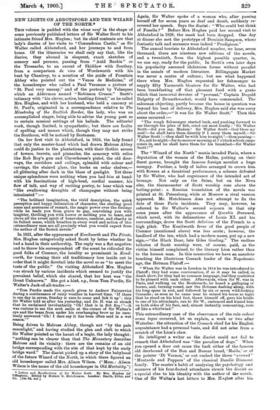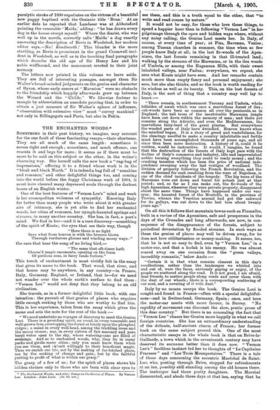This volume is padded with the views neuf in the
shape of some previously published letters of Sir Walter Scott to his intimate friend Mrs. Hughes ; but its chief contents are that lady's diaries of her visits to "Conundrum Castle," as Sir Walter called Abbotsford, and her journeys to and from home. Of the itineraries we shall only say that, like the diaries, they abound in eloquent, exact sketches of scenery and persons, passing from "Auld Reekie " or the Trossachs, to an ascent of Skiddaw with Southey, from a comparison de visa of Wordsworth with his bust by Chantrey, to a mention of the guide of Fountain Abbey who pointed out the "Venus de Medicine," of the housekeeper who called a Paul Veronese a picture of "St. Paul very uneasy," and of the portrait by Velasquez which an Alderman named "Robinson Crusoe." Scott's intimacy with "his clever, active, bustling friend," as he called Mrs. Hughes, and with her husband, who held a canonry at St. Paul's, originated in a correspondence relative to The Minstrelsy of the Scottish Border, the lady, who was an accomplished singer, being able to advise the young poet as to certain musical settings of his ballads. The editorial work, though limited, is sympathetic; but there are faults of spelling and names which, though they may not strike the Southron, will be noticed by Scotsmen.
On her first visit to Abbotsford, in 1824, the lady found that only the master-hand which had drawn Melrose Abbey could do justice to the plantations, with their Gothic screen of towers, turrets, and pinnacles, the armoury with relics like Rob Roy's gun and Claverhouse's pistol, the old door- ways, the corridors and ceilings, splendid with colour and carvings, the stained glass, the books on cedar shelves,— all glittering after dark in the blaze of gaslight. Yet these unique splendours were nothing when you had him at hand. with his fascinations of high-bred, cordial manner, his flow of talk, and way of reciting poetry, to hear which was "like swallowing draughts of champagne without being intoxicated ":— " The brilliant imagination, the vivid description, the quick perception and happy delineation of character, the sterling good sense and acuteness of remark, the magic power over the feelings while he leads you from grave to gay, convulsing you with laughter, thrilling you with horror or melting you to tears, and above all the sweet spirit of benevolence, candour, and charity in its fullest sense, which breathes in every word and action of this extraordinary man are all precisely what you would expect from the author of the Scotch novels."
In 1821, after the appearance of Kenilworth and The Pirate, Mrs. Hughes categorically asked Scott by letter whether he had a hand in their authorship. The reply was a flat negative. and to throw his correspondent off the scent he ridiculed the good folks of Cumnor, the locality so prominent in Kenil- worth, for turning their old traditionary lore inside out in order that it might dovetail into the novel so as "to meet the taste of the public." On visiting Abbotsford Mrs. Hughes was struck by various incidents which seemed to justify the prevalent belief, which she shared, that her host was "the Great Unknown." She got a hint, e.g., from Tom Purdie, Sir Walter's Jack-of-all-trades :— " Tom Purdie made the speech given to Andrew Fairservice during a continuance of rainy weather in harvest time. 'If there is one day in seven, Sunday is sure to c,ome and liek it up ' : this Sir Walter told us after tea yesterday, and Dr. H. was so struck that he exclaimed involuntarily Oh! that is in Rob Boy '—it was curious to see the arch smile at the corner of Sir Walter's eye and the beam from under his overhanging brow as he care- lessly answered 'Oh! I dare say it has been often said in a wet season."
Being driven to Melrose Abbey, though not "by the pale moonlight," and having studied the glen and cleft to which Sir Walter pointed as the haunt of a bogie, the lady thought : "nothing can be clearer than that The Monastery describes Melrose and its vicinity: there are the remains of an old bridge corresponding with the site of that kept by the surly bridge ward." The diarist picked up a story of the babyhood of the future Wizard of the North, in which there figured an old housekeeper called Mrs. Alison Wilson. ("Mem.: Alison Wilson is the name of the old housekeeper in Old Mortality.") • Lettere and Recollections of Sir Walter Scott. By Mrs. Hughes (of liffingtou). Edited by Horace G. Hutchinson. London : Smith, Elder, and Co. Lies. 6d. net
of Pendia ? " Before Mrs. Hughes paid her second visit to Abbotsford in 1828, the mask had been dropped. One day at dinner she met the prototype of Dominie Sampson, whose fantastic talk and manners were indeed "Prodigious."
The annual tourists to Abbotsford number, we hear, seven thousand, there are nineteen new editions of the novels, and a twentieth, from the highest possible quarter, is, we can say, ready for the public, In Scott's own later days his popularity assumed idolatrous forms without parallel in the annals of modern literature. Billingsgate Market was never a centre of culture ; but see what happened there when Mrs. Hughes requested her fishmonger to supply fifty Yarmouth bloaters for Sir Walter, who had been breakfasting off that pleasant food with a gusto which that immortal devotee of " provant," Captain Dugald Dalgetty of Drumthwacket, would have commended. The salesman objecting, partly because the house in question was beyond his beat of delivery, Mrs. Hughes said she was sorry about the order,—" it was for Sir Walter Scott." Then this scene occurred :—
" The rough fishmonger started back, and pushing forward to me through his piles of fish, cried out most loudly : Sir Walter Scott—did you say, Madam Sir Walter Scott—God bless my soul !—he shall have them directly if I carry them myself,—Sir Walter Scott 1.—they shall be with him to-night '—then pausing- ' No, not to-night—for to-morrow morning at 7 o'clock afresh cargo comes in, and he shall have them for his breakfast—Sir Walter Scott!"
The "Wizard of the North" mania invaded Paris, where a deputation of the women of the Halles, putting on their finest gowns, brought the famous foreign novelist a huge nosegay. Further, a body of ladies arranged to crown him, with flowers at a theatrical performance, a scheme defeated
by Sir Walter, who had cognizance of the intended act of homage. Not only on the Seine, but on the Neva also, the thermometer of Scott worship rose above the : a Russian translation of the novels was
printed at St. Petersburg, while at Moscow a rival version appeared. Mr. Hutchinson does not attempt to fix the date of these Paris incidents. They may, however, be referred to Sir Walter's second sojourn in that city some years after the appearance of Quentin Durward, which novel, with its delineations of Louis XL and his surroundings, drove the Scott delirium of the French to a high pitch. The Kenilworth fever of the good people of
Cumnor (mentioned above) was less acute ; however, the landlord of the inn, which had a modern name, put up a new sign,—"the Black Boar, late Giles Gosling." The endless tributes of Scott worship were, of course, paid, as the victim himself complained, to the literary Lion rather than to the human man. In this connection we have an anecdote touching the illustrious Cossack leader of the Napoleonic age, the Hetman Platoff :—
" When Sir Walter was in London in 1814 he was introduced to Platoff ; they had some conversation, if so it may be called, in. dumb show, for they had no common language, but they contrived- to be pleased with each other. Afterwards, when Sir W. was in Paris, and walking on the Boulevards, he heard a galloping of horses, and, turning round, saw the Hetman dashing along, with his long spear in rest, and followed by six or seven wild-looking Cossacks ; as soon as he came near he reined his horse so tight that he stood on his hind feet, threw himself off, gave his bridle to one of his attendants, ran to Sir W., embraced and kissed him on both sides of his face, and, almost instantly remounting, rode off like a whirlwind."
This extraordinary case of the observance of the rule cedant arms togae occurred, let us explain, a week or two after
Waterloo : the attraction of the Cossack chief for his English
acquaintance had a personal basis, and did not arise from a scratch of the Lion's claw.
So intelligent a writer as the diarist could not fail to remark that Abbotsford was "the paradise of dogs." When
you opened a door out came the bark either of the famous old deerhound of the Ban and Buscar breed, 'Maida,' or a the pointer `Di Vernon,' or out rushed the three " avowed "
'Mustards and Peppers' of the classical Dandle Dininont
family. The master's habit of analysing the psychology and manners of his four-footed attendants struck the diarist as
a special clue to his identity with the author of the novels. One of Sir Walter's last letters to Mrs. ILLzhes after his
paralytic stroke of 1830 expatiates on the virtues of a beautiful new puppy baptised with the Ossianic title Bran.' At an earlier date he reported that Landseer was at Abbotsford painting the venerable Maida,' adding : "he has drawn every dog in the house except myself." Where the diarist, who was well up in the novels, correctly calls Maids' a dog exactly answering the description of Bevis in Woodstock, her modern editor says,—No ! Kenilworth ! This blunder is the more startling, as Bevis is prominent in the grand Cromwell inci- dent in Woodstock, as well as in the touching final paragraphs which describe the old age of Sir Henry Lee and his noble wolfhound, and the monument erected to their joint memory.
The letters now printed in this volume we leave aside. They are full of interesting passages, amongst them Sir Walter's broad-minded judgments on the genius and character of Byron, whose early sneers at " Marmion " were no obstacle to the friendship which happily afterwards grew up between the Wizard and the " Childe." We likewise forbear to mangle by abbreviation an anecdote proving that, in order to obtain a just measure of Sir Walter's sphere of influence, "observation with extensive view" must "survey mankind" not only in Billingsgate and Paris, but also in Pekin.











































 Previous page
Previous page